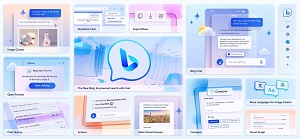News
Microsoft Announces New Bing/Edge AI Search Makeover
Microsoft, the leader in AI-powered web search with its Bing search engine and Edge web browser, announced a raft of search improvements as part of a new AI makeover.
Microsoft has previously pledged multi-billion-dollar investments in partner OpenAI, the leader in creating advanced generative AI systems powered by large language models (LLMs) used for cutting-edge machine learning projects like ChatGPT. Thus it was the first major industry search player to boost its search engine and search functionality via AI, though Google is following suit.
 [Click on image for larger view.] AI Makeover (source: Microsoft).
[Click on image for larger view.] AI Makeover (source: Microsoft).
Yesterday (May 4), the company announced several moves to further improve Bing/Edge search. Here's a summary of those moves, many driven by AI.
- Visual Search Results & Visual Search Inputs Advancing beyond text-only search and chat, Microsoft introduced richer, more visual answer options including charts and graphs and updated formatting of answers, helping users find information more easily. On the flip side of that, multimodal support is coming soon, bringing the ability for users to input text, images, speech and video in their searches.
- Moving to Open Preview -- No Waitlist: The advanced AI search functionality was initially introduced in a limited preview, with new tech gradually rolled out to users who requested to be put on a waitlist. Users can now avail themselves of the new AI tech simply by signing in with a Microsoft account.
- Single Use to Persistence: The company is moving beyond single-use chat and search sessions, introducing the ability to conduct multi-session productivity sessions -- complete with chat history (one of the most-requested features) -- with persistent chats now allowable in Edge.
- More Languages for Bing Image Creator: Recently announced Bing Image Creator integration in the "new Bing" chat experience is being improved with support for all languages (more than 100) used in Bing. Users can now generate both written and visual content in one place from within chat using their native language.
While the above are the four main takeaways from yesterday's post, several other highlights lifted from the lengthy post include:
- New changes that will roll out in an Edge redesign effort include a sleeker and enhanced UI including a streamlined look, rounded corners, organized containers and semi-transparent visual elements.
- Search productivity will be improved with the aforementioned chat history, which can be shared and exported. "And when you want to dig into something deeper and open a Bing chat result, your chat will move to your Edge sidebar, so you can keep your chat on hand while you browse. Over time, we're exploring making your chats more personalized by bringing context from a previous chat into new conversations."
- Microsoft Edge Chat will get improved summarization capabilities for long documents, including PDFs and longer-form web sites, helping users more easily consume dense online content.
- Edge actions will become available in the coming weeks, enabling users to leverage AI to complete even more tasks with fewer steps. "For example, if you want to watch a particular movie, actions in Edge will find and show you options in chat in the sidebar and then play the movie you want from where it's available."
- Edge mobile will soon include page context, so users can ask questions in Bing chat related to the mobile page being viewed.
"The new AI-powered Bing has already helped people more easily find or create what they are looking for, making chat a great tool for both understanding and taking action," Microsoft said. "The integration of Image Creator saves you time by completing the task of creating the image you need right within chat.
"We'll soon build third-party plug-ins into the Bing chat experience creating a platform for developers. For example, if you're researching the latest restaurant for dinner in Bing chat, it will leverage OpenTable to help you find and book a reservation. Or, with Wolfram|Alpha, you can create powerful visualizations and get answers to complex science, math and human-curated data-based questions directly from Bing chat. We are working with our partners at OpenAI to make it easier and as consistent as possible for developers to take advantage of this opportunity. We believe these types of skills are a game-changer in the reinvention of search and to advance opportunities for developers in search. We look forward to sharing more details at Microsoft Build later this month."
About the Author
David Ramel is an editor and writer at Converge 360.